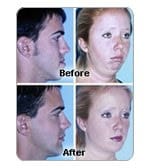Corrective jaw surgery also called orthognathic surgery can improve chewing, speech, and breathing. While your appearance may be dramatically enhanced as a result of your surgery, orthognathic surgery is performed to correct functional problems.
This procedure performed in dental surgery to correct a wide range of minor and major skeletal and dental irregularities, including the misalignment of jaws and teeth.
Am I a Candidate for Corrective jaw surgery (orthognathic) surgery?

What are the conditions that may also prompt a need for orthognathic surgery?
- Birth defects
- If you are experiencing Chronic jaw or jaw joint (TMJ) pain
- Involuntary mouth breathing
- The inability of your lips to come together without straining
- Trauma or injury to the jaw or face
- Open bite (space between the upper and lower teeth when your mouth is closed)
- Protruding jaw
- Receding lower jaw and chin
Corrective jaw surgery risk
Because the surgery is usually performed under general anesthesia, you may experience numbness in the area as well as pain, swelling, bleeding, infection and adverse reaction to anesthesia.
Also, injury to the nearby bone. It may take six weeks of recovery at home. make sure you follow your doctor advice. In the case of children, typically includes brushing after every meal using a small, gentle kids' toothbrush such as the My First Colgate™ toothbrushes and toothbrushes for older children or tweens.
Corrective jaw surgery cost
If you don't have health insurance, orthognathic surgery cost around $20,000 to well over $40,000 in the United State according to CostHelper.
However, if your case is Beyond orthodontics, your cost may be higher because of the severity of your jaw misalignment and what type of surgery is required. Your location, country, and the hospital treating you during care can all make a difference as well.
Although corrective jaw surgery is supposed to be a medical procedure, not a cosmetic procedure, it is possible to reduce your expenses on health and dental conditions. Your health insurance policies may cover part of the cost of corrective surgery.
Enjoy Your New Look Jaw!
- Periodontal Disease: Causes, Symptoms and Home Treatment.
- What You Should Know About Osteonecrosis of the Jaw
- Pain in your jaw? 5 Likely Causes of Pain in the Lower Jaw Bone
- Best Universities to Study Dentistry in Nigeria.
- Gum Disease: When to see your dentist?
- How Long Do Dental Implants Last?
- Dental Elevators and their uses
The content is intended to augment, not replace, information provided by your clinician. It is not intended nor implied to be a substitute for professional medical advice. Reading this information does not create or replace a doctor-patient relationship or consultation. If required, please contact your doctor or other health care provider to assist you to interpret any of this information, or in applying the information to your individual needs.
